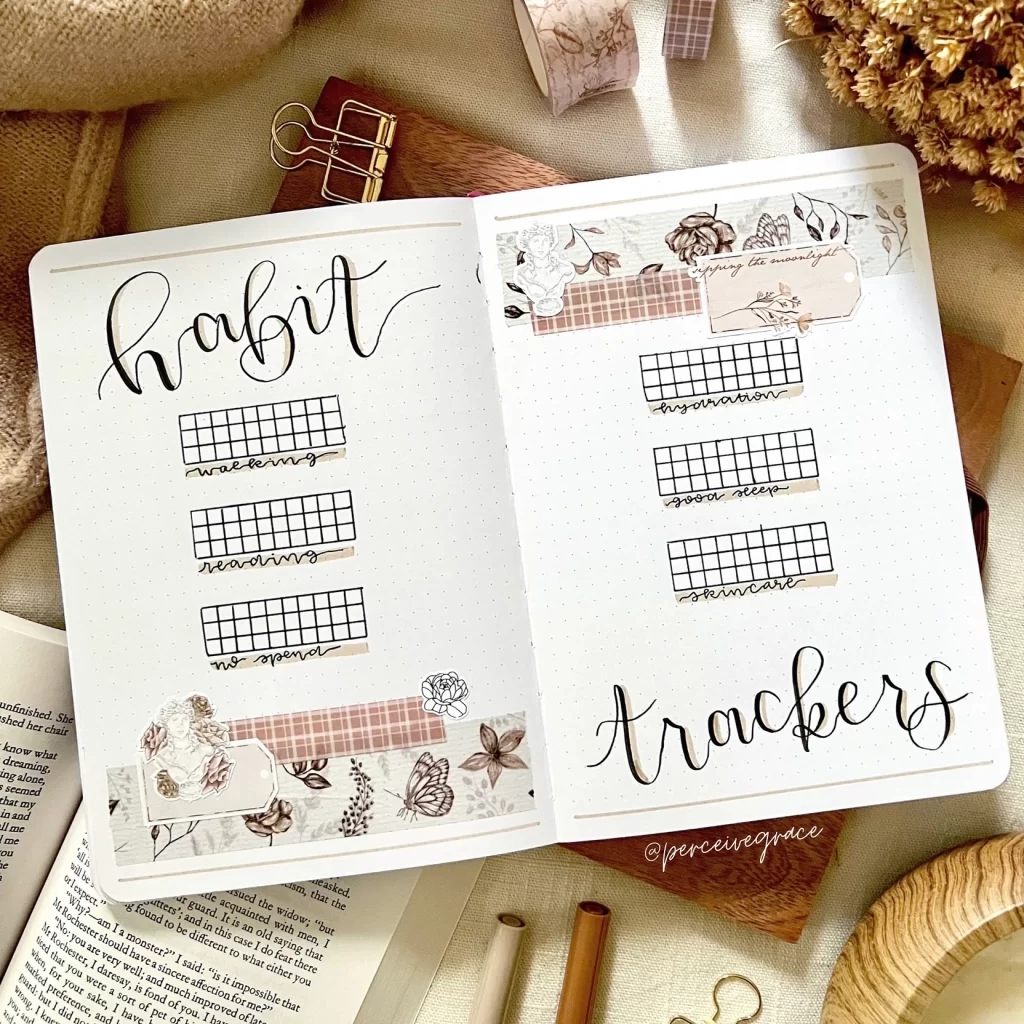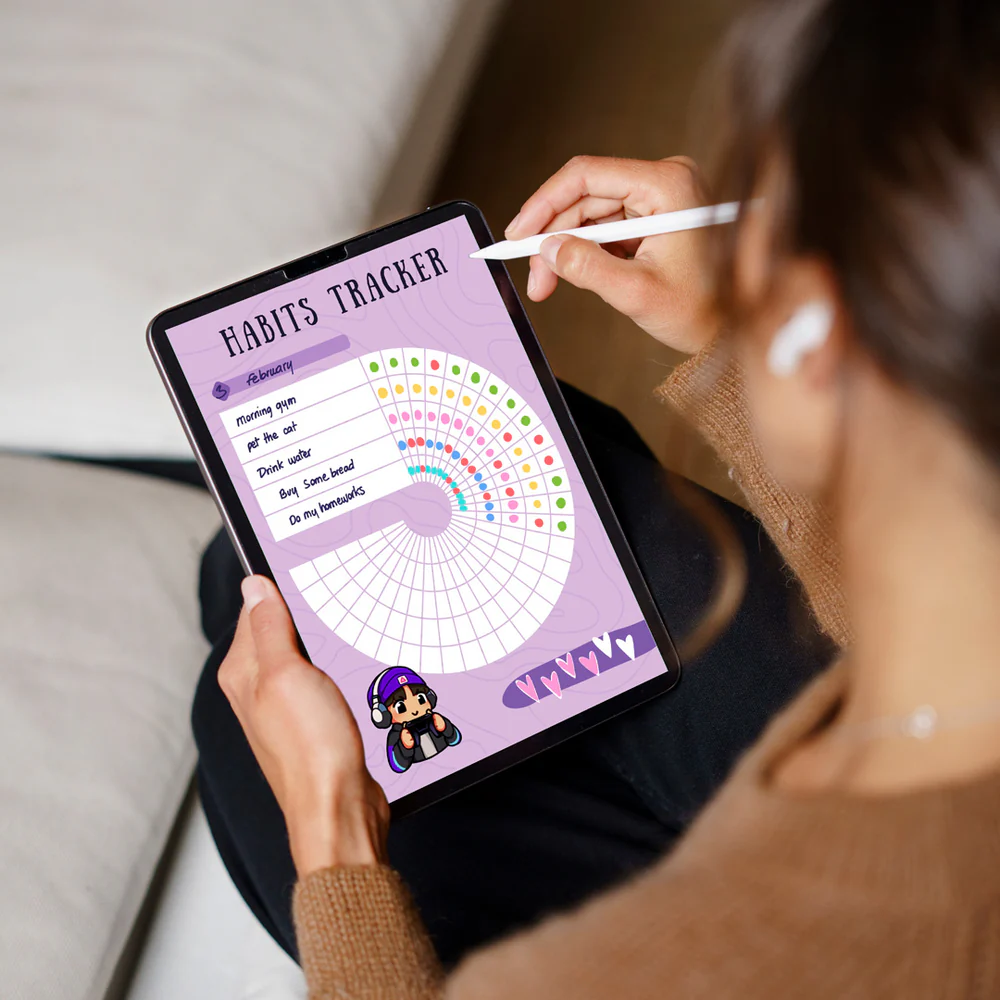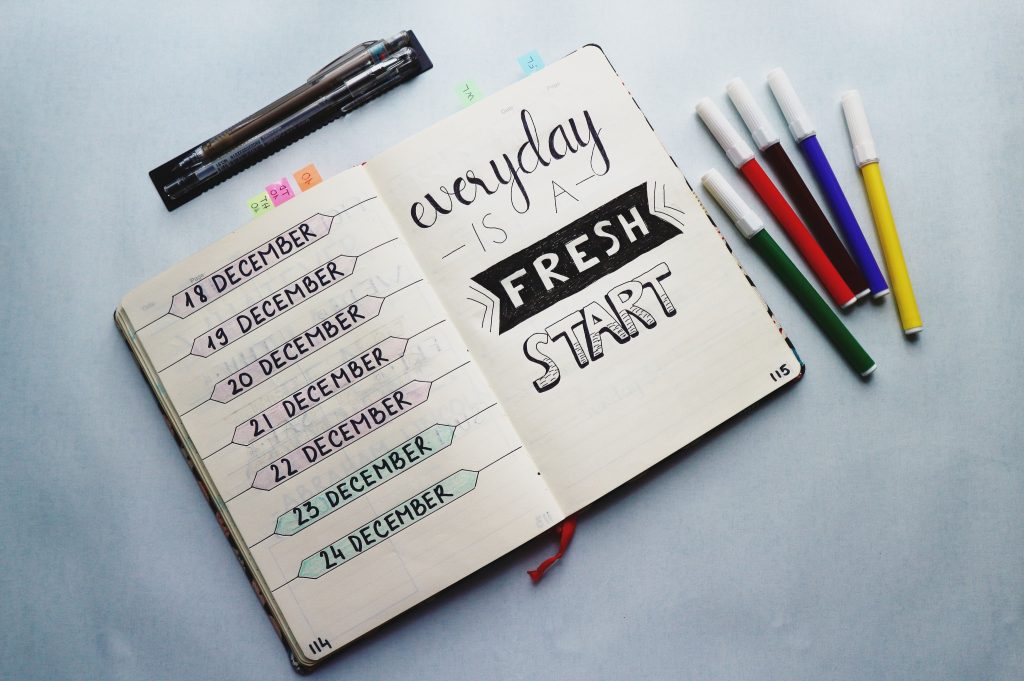Table of Contents
What is a habit tracker? A habit tracker is an essential instrument for anyone aiming to enhance their daily life by monitoring patterns and routines. By diligently tracking and measuring one’s actions, individuals gain invaluable insights into their behavior, empowering them to make deliberate changes. This process not only facilitates the identification of areas needing improvement but also catalyzes the development of new, beneficial habits.
Utilizing a habit tracker can transform aspirations into tangible outcomes. Through consistent use, it becomes a personal accountability partner, providing a visual representation of progress and encouraging persistence in the pursuit of personal goals. Whether digital or analog, it is a powerful tool for life improvement.
Understanding the Basics of Habit Tracking
To track habits effectively, one must consistently record and analyze their daily actions about their goals. This simple yet profound practice lies at the core of habit tracking.
In the realm of personal development, a habit tracker plays a pivotal role. By tracking and measuring progress, it acts as a mirror reflecting one’s daily practices. This reflection is vital, as it allows individuals to see which habits contribute positively to their growth and which ones may be hindering their progress. It’s about gaining self-awareness and using that knowledge to sculpt a better self.
Moreover, a habit tracker is a commitment device, that encourages users to stay true to their personal development plans. It bridges the gap between intention and action, transforming abstract goals into concrete steps. Through consistent use, it embeds the discipline required for meaningful personal transformation.

Habit Tracking Methods: Digital vs Analog
The debate between digital and analog habit tracking is one of personal preference and lifestyle compatibility. Digital habit-tracking apps offer convenience, allowing users to sync data across devices and access their information anytime, anywhere. These apps often include features to set reminders for tasks and habits, track habits with precision, and visualize completion rate statistics to motivate users toward their monthly goals.
On the other hand, a plain notebook as a habit-tracking method brings a tactile and personalized experience. Some argue that writing by hand enhances memory retention and provides a more intimate connection with one’s goals. The choice between a habit tracker app and a simple journal should align with one’s habits, preferences, and the type of engagement they seek with their tracking practices.
Embracing Technology: Pros and Cons of Digital Habit Trackers
Digital habit trackers offer an array of advantages, including the ease of tracking multiple habits at once and providing instant feedback on progress. Users appreciate the ability to set notifications, which serve as prompts to perform desired behaviors. Moreover, digital habit trackers often come with analytical tools that help identify patterns and optimize routines for better outcomes. However, they also have downsides, such as potential distractions from other apps and the need for electronic devices, which may not be accessible to everyone.
Furthermore, reliance on technology can lead to a disconnection from the physical act of writing, which for some, is a critical part of the habit formation process. There’s also the concern of digital privacy and the security of personal data stored within these apps. Weighing these pros and cons is crucial for anyone considering digital habit trackers as a means to personal betterment.
The Charm of Analog: When to Use Pen and Paper
The allure of analog habit tracking lies in its simplicity and tangibility. When using pen and paper, there is a direct, mindful engagement with one’s habits that some users find more meaningful than tapping on a screen. Writing down goals and accomplishments can feel more rewarding and can help solidify commitment to change. Analog tracking is also free from digital distractions and does not require any technical know-how or devices, making it universally accessible.
However, analog tracking lacks the convenience of digital habit trackers, such as automated backups and the ability to easily edit or rearrange entries. It may also be less efficient for those who have multiple complex habits to monitor. Still, for those who appreciate the act of writing and a physical reminder of their goals, pen, and paper can be an effective habit-tracking method.
Fitness and Health Routines
Monitoring fitness and health routines is crucial for maintaining overall well-being. A habit tracker can help ensure consistency in workouts, dietary habits, and other health-related behaviors. By tracking these activities, individuals can observe the impact of their routines on their health and adjust accordingly to achieve their desired results.
Sleep Patterns and Quality
Quality sleep is foundational to good health. By using a habit tracker to record sleep patterns, individuals can identify trends and factors affecting their rest. This awareness can lead to improved sleep hygiene and ultimately, a more energized and productive life.
Relationship and Social Interactions
Tracking relationships and social interactions can highlight the importance of nurturing connections with others. A habit tracker can help individuals allocate time for family and friends, ensuring that social well-being is a consistent part of their lives.
Personal and Professional Growth Activities
Investing just 30 minutes a day in personal and professional development can lead to significant growth over time. A habit tracker can help individuals carve out this time and hold them accountable for their self-improvement commitments.

The Power of Habit Trackers in Action
Habit trackers empower individuals to turn aspirations into reality. They provide a structured approach to personal enhancement, fostering discipline and consistency.
The Psychological Benefits of Habit Tracking
Habit tracking offers more than just organizational benefits; it also supports psychological well-being by reinforcing a sense of control and accomplishment.
Boosting Motivation Through Visible Progress
Visible progress is a powerful motivator. When individuals can see the strides they’re making through habit tracking, it fuels their desire to continue pushing forward and setting new goals.
The Reality Check: Keeping Honest with Yourself
Honest self-assessment is vital for growth. A habit tracker serves as an unbiased record that helps individuals confront their actual behaviors, rather than their perceived efforts, leading to more authentic personal development.
The Reminder Effect: Staying on Course with Daily Actions
Let’s get real: sticking to new routines is a challenge. But here’s where tracking your habits comes into play. A habit tracker serves as a daily nudge, a gentle reminder to engage in practices that better you, like your gratitude practice. It’s all about keeping visible tabs on your progress, and that little act of checking off a task can give you the nudge to keep pushing forward. It’s the consistency that these reminders foster that truly helps you stay on course with your daily actions.
How Habit Tracking Leads to Sustainable Change
Habit tracking is not just about monitoring; it’s a catalyst for real, lasting change. By systematically keeping an eye on your daily routines, you’re able to hold yourself accountable and build a structure that fosters improvement over time.
From Planning to Execution: Laying Out Your Habit Goals
Planning your goals is one thing; executing them is another. When you lay out your habit goals, you’re building a roadmap to success. It’s about pinpointing what you want to achieve and breaking it down into actionable steps. This way, you transform lofty aspirations into bite-sized tasks and habits that you can tackle day by day.
Choosing the Right Tool: Apps vs. Journals
When it comes down to tracking your habits, the debate often lies between digital apps and traditional journals. Each has its merits. Apps offer convenience, alerts, and analytics, while journals provide a tangible record that many find satisfying to fill out. The right choice depends on your taste and which method you’ll stick with to ensure your tasks and habits are consistently monitored.
Frequency Matters: Deciding Between Daily, Weekly, or Monthly Tracking
How often should you track your habits? Well, it depends on the habit itself. Daily tracking is great for building routines, like your gratitude practice, which benefit from repetition. Weekly tracking might suit goals that require more time, like project milestones, and monthly tracking can be ideal for reflecting on broader life changes. The key is to match the tracking frequency with the nature of the habit you’re aiming to cultivate or change.
The Best Habit Tracker Options Available
There’s a sea of habit trackers out there, but finding the best fit is crucial for sticking to your goals. Let’s dive into some top choices tailored for different platforms and needs.
Top Habit Tracker Apps for iOS Users
iOS users have access to a variety of apps designed to help manage and maintain good habits. Let’s explore some of the standout options available on the App Store.
Streaks: Simplicity Meets Functionality
Streaks is the go-to for many iOS users seeking a balance between simplicity and functionality. The app’s clean interface lets you track up to twelve tasks, encouraging you to maintain your streaks. It’s ideal for those who want a straightforward approach to their habit-tracking apps without any fuss.
Habitify: A Comprehensive Organizational Tool
Habitify sets the bar high as a habit-tracker app, offering a sleek design and a comprehensive organizational tool for your habit-tracking journey. Whether you’ve completed a habit or you’re tracking daily, Habitify provides insights and reminders to keep you focused. It’s perfect for those who appreciate structure and enjoy the benefits of habit tracking, like when you’ve listened to a podcast and need to log in.
Leading Habit Tracker Apps for Android Enthusiasts
Android users aren’t left out in the cold when it comes to managing their habits. There are several robust apps available that cater specifically to their platform.
HabitNow: Customization at Your Fingertips
HabitNow offers Android users a level of customization that’s hard to match. With this app, you can tweak and tailor everything to fit your specific tracking needs, making it easier than ever to stay on top of your habits and routines.
Way of Life: For the Data-Driven Individual
For those who love to dive into the data, Way of Life is a dream. This app provides detailed charts and graphs that help you analyze your progress over time, making it a great tool for anyone looking to take a data-driven approach to their habit tracking.
Gamifying the Experience with Habitica
Habitica takes a unique approach by turning the task of tracking your habits into a role-playing game, adding a layer of fun and engagement to your personal development journey.

Practical Steps to Implement Habit Tracking in Your Life
If you’re ready to take control and start tracking habits, there are practical steps you can take to integrate this powerful tool into your daily life, ensuring that you’re on the path to a better you.
Initiating the Habit Tracking Journey
Starting a habit-tracking journey is like setting sail toward a more disciplined life. It begins with identifying the behavior you want to adopt or eliminate, a crucial step that sets the foundation for personal transformation.
1. Isolating the Habit You Want to Foster or Break
First things first, pinpoint the habit that’s either going to add value to your life or one that you’re better off without. Maybe it’s exercise, reading, or cutting down on sugar. The key is to focus on one habit at a time to avoid overwhelm.
2. Choosing Your Ideal Habit Tracking Method
Choosing a habit-tracking method is about finding the right tool that resonates with your lifestyle. Whether it’s a plain notebook for simplicity or an app that can sync data across devices, your selection should bolster your completion rate of monthly goals.
3. Ensuring Your Habit Tracker Is Always Accessible
To truly benefit from habit tracking, your chosen method must be at your fingertips. If it’s an app, keep your phone charged and notifications on; if it’s a journal, carry it with you. Accessibility ensures consistency and accountability.
Wrapping It Up: What Is a Habit Tracker
A habit tracker is more than just a tool; it’s a companion on the journey to self-improvement. It provides a series of visual cues that keep you aligned with your weekly habits, ensuring that you don’t lose sight of what’s important.
Habit tracking is a game-changer. It’s managed to meditate your focus, wait for the long-term rewards, and achieve desired results. With pen and paper or digital aids, it’s the scaffolding upon which you can build new habits efficiently.
To build a new habit, consistency is key. Dedicate 10 minutes each morning or evening to plan and reflect. This small investment of time ensures that your actions are intentional and aligned with your personal growth.

I’m Julio, a 53-year-old married father of four boys. Ever since my children were young, I’ve been passionate about sharing life wisdom and empowering others to lead more fulfilling lives. Join me on this journey of discovery as we uncover practical strategies for personal growth and fulfillment.